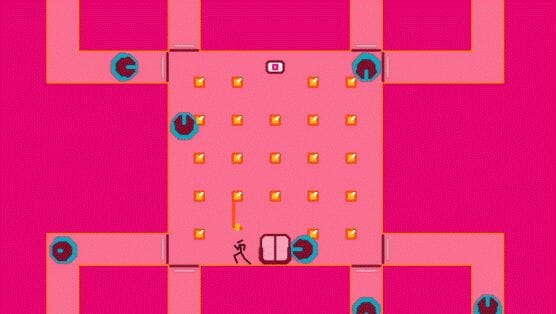N++: Hold On Loosely

The first achievement I got in N++ is called “You Suck But That’s Okay.” You get it for dying during the game’s introductory levels. I’d always thought I was pretty good at N+, the previous version of the game, at least for someone who hadn’t managed to finish all of that game’s levels. So I was kind of miffed by N++ having that kind of trophy, mocking the player for not being the kind of savant these kinds of incredibly difficult, trial-and-error platformers tend to turn you into. That attitude turns players away from something they might otherwise enjoy. Now, after almost 15 hours of playing N++, I think that trophy is actually more earnest than mocking.
Instead of the stubborn, bash-your-head-against-it anger and accompanying sense of accomplishment I get out most of the games which followed it, I found N+ relaxing. The N series has always been about momentum, about the way every decision you make up to the end of the level affects whether or not you’ll make it to the end. It matters on every level, where your first jump will affect how fast you’re going when you land and slide, which affects how fast you’ll soar on the subsequent jump. It matters on each set of five levels, where how much gold you collect on each level affects the remaining time you have to complete the rest. It’s easy to relate this to driving a car at high speed or something, to call it an intense experience requiring your full attention.
But it really isn’t. Maybe this has always been true for all of these games, but despite how hard every iteration of N is, how often I feel stuck in its levels, the trick is not letting it get to me that I could I be stuck on a single level for hours. It’s about letting the effort define the experience, and not the failure. I put on some music or a podcast and the game is something to do while I listen. In that sense, the “masocore” genre, which has always been described as “tough-as-nails,” “unforgiving” or other hyperbolic terms that make it seem as though the games are mean or strict, is full of some of the most soothing, relaxing experiences in videogames.
N++ just makes this more apparent through the rest of its design. There are hundreds of moments in N++ where you’re simply waiting to see the result of your input, your jump, your decision to squish your trajectory mid-air by pulling back on the analog stick. But like the peak of any jump, there’s a moment where you’re completely still, where you’re hoping the jump works out the way you want it to. Sometimes you can tell the moment you take off that you’re not going to make it and you restart right then and there. This is what makes N++ stressful, because it can make you feel helpless.
Sometimes you ride it out, because you should be playing N++ less for the results, the 100% completion pages, and more for the simple joy of it. It doesn’t matter that you’re going to botch the landing—it’s fun to try anyway. It’s fun to do most of a level right, even if you don’t know how to get past the missile launcher, spike bomb and Roomba drone combo towards the end. Learning to do these levels right, repeating these things time and again, is soothing, and there’s a tactile joy to moving around in its spaces.
